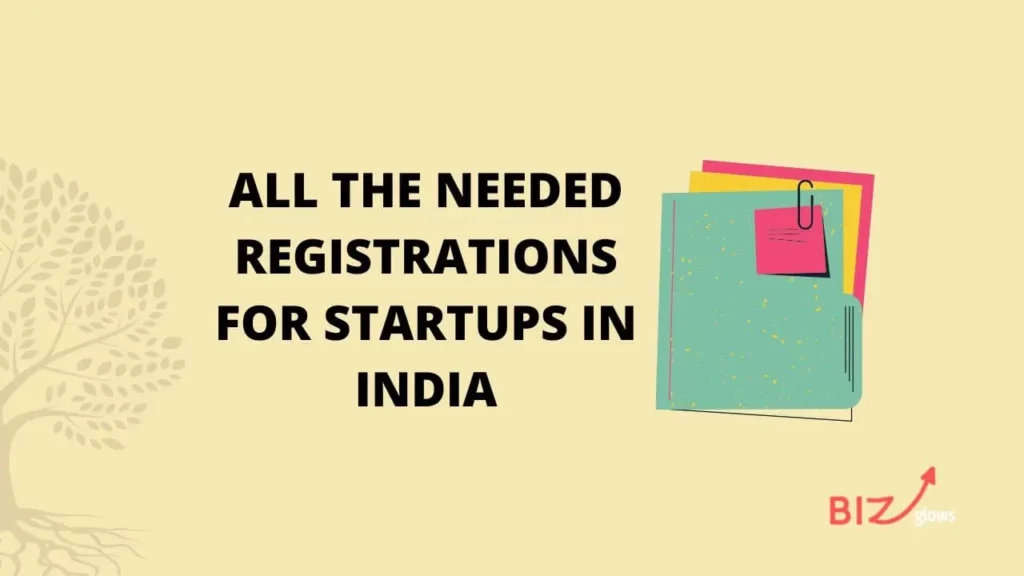The process of establishing a startup contains a few complexities. Just having a great idea and a strong business strategy is not enough to kick-start your company. There are certain registrations that you need to do for it. These registrations will let you get recognized by the Government of India as a startup.
Without completing these registrations, you will not be able to get your business operations underway. Also, these registrations would help you to leverage certain special facilities. These facilities are provided by the Indian government to support private companies that are just getting started. In this article, we shall provide a list of the necessary registrations that an entrepreneur needs to do to get his or her startup up and running.
1. Registrar of Companies (ROC)
The Registrar of Companies is an office under the Ministry of Corporate Affairs (MCA). The MCA looks after the administration of Private Limited companies and Limited Liability Partnerships (LLPs). Section 609 of the Companies Act, 1956 and section 396 of the Companies Act of 2013 assign ROC with the duty of registering all the companies and LLPs across the country.
Every company requires the approval of ROC to come into existence. It provides every company with an incorporation certificate that acts as evidence of the existence of that company. The ROC supervises the regulation and reporting of companies. It also completes the reporting of the shareholders and directors of a company and directs government reporting such as annual filing and other important documents.
It also maintains the records of every company and allows the general public to access this information on the payment of a prescribed fee.
The documentation required to be presented to the ROC includes the following:
· Memorandum of Association (MoA)
· Articles of Association (AoA)
· Pre-incorporation agreement for appointing directors
· Declaration by an authorized person confirming that requirements related to the registration have been taken care of
After the authentication of the documents, the ROC adds the name of the company in the register of companies and issues a certificate of incorporation along with a certificate of commencement of business. The ROC also holds the power to refuse the registration of a company with a disagreeable name and unlawful objectives.
2. Startup India
Startup India is a fabulous program launched by the Government of India to support startups in their initial years. This program provides a lot of benefits and backing to startups so that they can successfully transform into big businesses. Hence, any Indian entrepreneur looking to launch a startup should apply for this program as it will definitely boost his or her chances of success.
Benefits of Startup India
· Patents, trademarks or design registrations- If you require to register a trademark or design or need to patent your inventions, you can easily approach a facilitator from the list of facilitators provided by the government. You will enjoy the benefit of an 80% reduction in fees as you will only need to pay the statutory fees.
· Funding- The Government of India has set up a fund with an initial corpus of INR 2,500 crores over a period of 10 years, which totals it to INR 10,000 crores. This money will be available in the form of Funds of Funds. This means that this amount will be shared with the Securities and Exchange Board of India (SEBI) registered venture capital firms so that they can further invest it in different startups.
· Self-certification under labour laws and environment laws- Startups can self-certify under labour laws and employment laws, therefore, reducing compliance costs. This also reduces the regulatory burden and allows startups to focus on their business.
· Tax exemption- Startups are not required to pay the income tax for a period of three years. But this can be availed only by getting certified by the Inter-Ministerial Board (IMB).
Eligibility criteria to be recognized as a startup
· The firm needs to be a private limited company or a Limited Liability Partnership (LLP).
· The company must not be more than 5 years old at the time of registration.
· A company is recognized as a startup for the first 10 years after its registration of the company.
· A company is recognized as a startup if the turnover per year does not exceed INR 100 crores in any of the first 10 years.
· The details of the funding of the startup must be registered with the Securities and Exchange Board of India (SEBI).
· The firm must be approved by the Department for Promotion of Industry and Internal Trade (DPIIT). More on DPIIT recognition will be discussed later.
Documents required
· Certification of Incorporation of the company.
· Proof of funding, if any.
· Letter of authorization of the authorized representative of the company or LLP.
· Patent and trademark details, if any.
· PAN number
· List of awards and certificates of recognition, if any
· Description of your business
Steps for registering for Startup India
· Visit the Startup India website, fill in the necessary details and follow the instructions. In doing so, your profile will be created.
· Once your profile is created, you will be able to reap the benefits of acceleration, mentorship programs, Learning and Development programs, schemes of the Government and pro-bono services by applying for them.
· For applying for a recognition number by the DPIIT, you need to fill up the Startup Recognition form with the details of the authorised representative, office address, entity details, details of partners or directors, objectives of the startup and self-certification.
· Once applied, you will receive your recognition number after all the documents have been scrutinized and verified. This usually takes only 2 days after the submission of all the necessary details.
3. Department for Promotion of Industry and Internal Trade (DPIIT)
To avail of the benefits of Startup India, it is necessary to be recognized by the Department for Promotion of Industry and Internal Trade or DPIIT. DPIIT is in charge of making companies eligible to be recognized as a startup. Hence, one must register with DPIIT to get this recognition.
The usefulness of DPIIT recognition is vast. It allows startups to self-certify under 6 labour laws and three environment laws for a period of 3 years along with being exempted from paying tax for 3 years. It also provides access to several intellectual properties, services and resources. Added to these, are the benefits of relaxation in government procurement norms.
The process of getting DPIIT recognition is simple and can be done from the Startup India website or mobile app. You just need to log in with your credentials and click on the ‘DPIIT Recognition for Startups’ button under the ‘Schemes and Policies’ tab.
4. GST registration
The Goods and Service Tax registration has been mandated by the Government of India for every business whose turnover exceeds INR 20 lakhs (INR 40 lakhs or 10 lakhs, depending upon the state and kind of supplies) per year. If a business does not register for GST in an intentional attempt to evade taxes, then a penalty of 100% of the due tax amount will be levied upon the business.
The process of registering your business for GST is simple and free of cost. It can be done by visiting the GST portal and clicking on the ‘Register Now’ link under the ‘Taxpayers’ tab. In doing so, you will be prompted to provide the necessary details and documentation.
Documents required
· PAN card
· Aadhaar card
· Business address proof
· Bank account statement and cancelled check
· Certificate of incorporation
· Director’s ID proof, address proof and photograph
· Letter of Authorization from authorized signatory
· Digital signature
5. MSME registration
MSME stands for Micro, Small and Medium Enterprises. The MSME Act was introduced by the Indian government to facilitate such businesses with a lot of benefits. This would ensure hassle-free business operations for MSMEs.
Benefits of registering as an MSME
· Cheaper bank loans with an interest rate of around 1% to 1.5%.
· Allows credit for Minimum Alternate Tax (MAT) to be carried forward for 15 years instead of 10.
· Cost of getting patents done gets reduced.
· Access to a variety of government schemes such as Credit Guarantee Scheme, Credit Linked Capital Subsidy Scheme, Public Procurement Policy etc.
· Eligibility for priority sector lending from banks.
· Government security deposit which is beneficial for e-tenders.
· Barcode registration subsidy
· ISO certification fees reimbursement.
· Electricity bill concession
· Special consideration in international trade fairs.
Eligibility for MSME registration
For being eligible as an MSME, a business must come under the following classification:
| Business type | Investment | Annual Turnover |
| Micro | Less than INR 1 crore | Less than INR 5 crore |
| Small | Less than INR 10 crores | Less than INR 50 crores |
| Medium | Less than INR 50 crores | Less than INR 250 crores |
Registration for MSME
The registration for MSME can be done under the following two categories:
· For new entrepreneurs who are not previously registered as an MSME or those with EM-II.
· For those having registration as UAM.
The registration process for MSME is completely online and can be done through the government portal of Udyam. No additional documents other than Aadhar card and PAN card is required for registration as MSME. The turnover and investment details of the business will be acquired directly by Udyam.
6. Trademark registration
Trademarks are a special sign that distinguishes your company from others. It allows consumers to recognize your brand owing to its uniqueness and restricts others from spreading false information about your company. Hence, it is important to register a trademark for your company.
A trademark can be in the form of a letter, word, number, phrase, graphic, logo, sound mark, a mix of colours or a combination of these. Trademarking your brand is important as it will protect your brand’s name, reputation and ideas. The Trademark Act of 1999 classifies trademarks as intellectual property and protects their rights from infringement.
Trademarks expire after 10 years but can be renewed again for another 10 years. Trademark registration is of two types:
· TM-I- Such trademarks are registered for a specific class only. The payable fee for such registration is INR 3,500.
TM-A- Such trademarks are registered for multiple classes. This is further classified into two cost brackets. For startups and small enterprises, the cost is INR 4,500 for e-filling and INR 5000 for filing the form manually.
Conclusion
Registering your startup is an important task that must be done at the very beginning stage of your startup. Registrations open the door to a wide spectrum of opportunities and benefits. The Government of India provides entrepreneurs with the essential guidance and resources through its various programs if they have registered their companies. But not registering your startup may land you in trouble during the operations of your business. Hence, registering your startup is mandatory.
In this article, we discussed the must-do registrations for a startup in India. We talked about the benefits of these registrations while guiding you through the registration process. I hope that these registrations will assist you in getting your startup recognized and wish you all the best for your business.




